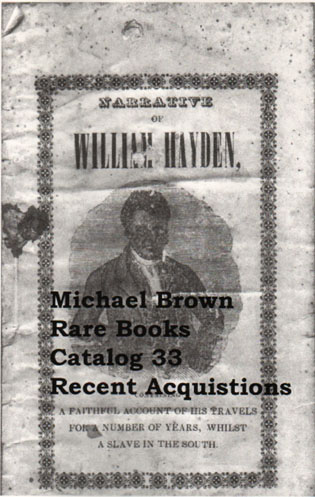Americana, Water and the American West:<br>This Month’s New Americana Catalogues
- by Michael Stillman

Michael Brown's recent acquisitions in Americana.
By Mike Stillman
This month we have two recently arrived catalogues of Americana to review. One is a catalogue of recent acquisitions by Michael Brown Rare Books, the other a catalogue concerning the scarce resource of water in the American West from Schoyer’s Books.
Michael Brown Rare Books of Philadelphia offers “Catalog Number 33 – Americana Recent Acquisitions.” There’s no specific focus within Americana other than most works are from the 19th century, so there’s likely to be something of interest to anyone who collects within the field.
Collectors of George Armstrong Custer will be interested in item 33, a resolution passed by the Iowa legislature in 1865. Even then Custer was getting in trouble. Concerned about troop discipline at the close of the Civil War, Custer imposed severe penalties on misbehaving members of the First Iowa Cavalry under his command. This did not sit well with the Iowa legislature, which issued this condemnation. The problem was resolved by effectively shifting Custer to charge of the new 7th Cavalry, a position he still held when that certain unpleasantness at Little Big Horn arose. Priced at $450.
Brown offers several interesting slave narratives. Item 2, The Life and Sufferings of Leonard Black, A Fugitive from Slavery. Written by Himself tells of his experiences as a slave and his escape. Printed in New Bedford, Massachusetts, in 1847, Black hoped to gain enough money from the book’s sale to further his education. But he didn’t expect this much. $3,000. Item 6 is the Narrative of William Hayden, who in this 1846 Cincinnati publication retells forty years of travels while held in bondage. Hayden amazingly was able to gain sufficient education and skills while a slave to buy his own freedom and that of his mother and sister. $6,500. Item 7 is the Incidents in the Life of a Slave Girl from 1861. This is an unusual early slave narrative by a woman. $1,500.
An early anti-slavery text is offered entitled The Mirror of Misery; or, Tyranny Exposed. Extracted from Authentic Documents and Exemplified by Engravings. Printed in 1811, this book includes sections on the evils of slavery and the slave trade, and numerous engravings depicting such things as the manner in which slaves were restrained, beaten and branded while being transported to America. Item 9. $3,000.
Another impassioned plea on behalf of the abused, this time Native American Indians, is found in item 79. This is a 7-page letter to the editors of the Columbia (Pennsylvania) Daily News from F.E. Parker of Lockport, New York, dated May 22, 1890. Parker was a member of the Seneca Indian tribe, and he recounts the constant seizures of Indian lands by the settlers. “Can you point to a single treaty ever made by the Government with any tribe of Indians that the United States has not violated?” Parker asks. There must be one somewhere, but if so, it surely is the exception. $650.